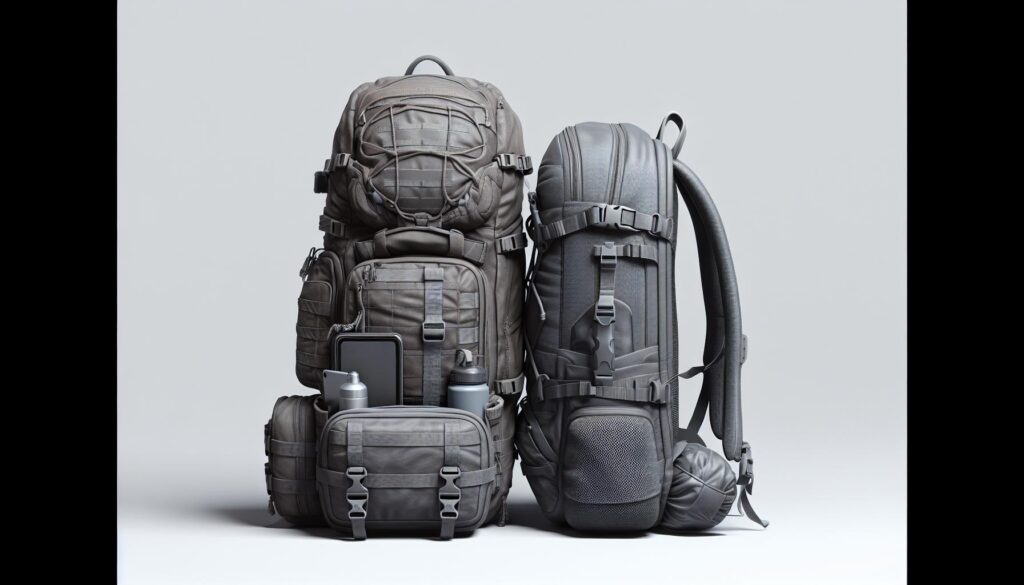Daypacks and backpacks, two essential companions for your journeys, each serve unique purposes. Daypacks, being smaller, are perfect for day trips, while backpacks, with their larger size, are more suitable for extended trips or carrying heavy loads. Your choice between the two ultimately depends on your specific needs and preferences.
Table of Contents
Understanding Daypacks And Backpacks
Daypacks and backpacks are both essential bags for carrying belongings, but they serve slightly different purposes. A daypack is a smaller backpack designed for short trips or day-to-day activities. Its compact size makes it easy to carry around, and it typically has enough space to accommodate essentials such as a water bottle, snacks, and personal items. Daypacks often have multiple compartments and pockets for better organization, allowing users to easily access their belongings.
On the other hand, a backpack is a larger bag suitable for longer trips or carrying heavier loads. It usually has a larger capacity and more room for items such as clothes, electronics, and books. Backpacks are commonly used for hiking, traveling, or attending school, as they can distribute weight evenly across the back and shoulders, reducing strain on the body.
In summary, daypacks are ideal for shorter trips and everyday use, while backpacks are more suitable for longer trips and heavier loads. Both bags offer convenience and functionality, allowing individuals to carry their belongings comfortably.
Choosing Between A Daypack And A Backpack: Factors To Consider
When deciding between a daypack and a backpack, there are several factors that you should take into consideration. First, think about the purpose and intended use of the bag. If you are planning a short day trip, a daypack with a smaller capacity might be sufficient. However, if you are embarking on a longer adventure or need to carry more items, a larger backpack could be more practical.
Capacity and storage options are also important considerations. A daypack typically has a smaller capacity and fewer compartments, making it ideal for carrying just the essentials. On the other hand, a backpack often has larger interior space and additional pockets or organizers, allowing for better organization and storage of your belongings.
Comfort and ergonomics play a crucial role in your decision-making process. A well-designed backpack with adjustable straps and padding on the back panel can offer more support and distribute weight more evenly, making it a more comfortable option for longer journeys.
Durability and weather resistance are vital factors to keep in mind. Backpacks are generally built to withstand rougher conditions and offer more protection against the elements compared to daypacks. Consider the materials and construction of the bag to ensure it can withstand the wear and tear of your intended use.
Style and aesthetics may also influence your decision. Daypacks are often more compact and sleek, while backpacks can come in various designs and styles. Choose a bag that aligns with your personal preferences and fits your overall style.
Lastly, consider accessibility and organization. Daypacks usually provide quick and easy access to your belongings with fewer compartments, while backpacks may come with more organizational features that allow for better accessibility and a more organized packing system.
The Versatility Of Daypacks Explored
| Daypack Vs Backpack |
|---|
| Exploring the Versatility of Daypacks |
Daypacks are a versatile and practical choice for a variety of purposes. Whether you are going on outdoor adventures, traveling or commuting, or need a backpack for school or work, a daypack has got you covered.
Daypacks for Outdoor Adventures: When it comes to outdoor activities such as hiking, camping, or biking, a daypack is an ideal companion. With their lightweight design and multiple compartments, daypacks allow you to carry essential gear, water bottles, snacks, navigation tools, and more, providing easy access to everything you need while you’re on the move.
Daypacks for Travel and Commuting: If you’re a frequent traveler or commuter, a daypack offers convenience and functionality. These backpacks are designed with features like padded laptop compartments, internal organizers, and external pockets for quick access to your belongings. Daypacks are also compact enough to fit under airplane seats or in overhead compartments, making them a practical choice for travel.
Daypacks for School and Work: Students and professionals alike can benefit from using daypacks for school or work. With their spacious interiors and various pockets, daypacks provide ample storage for textbooks, notebooks, laptops, pens, and other essentials. The ergonomic design and padded straps ensure comfort, even when carrying heavy loads throughout the day.
The Versatility Of Backpacks Analyzed
Backpacks are incredibly versatile and can be used for various purposes such as hiking, camping, travel, backpacking, school, and college. For hiking and camping, backpacks provide ample storage to carry essentials like water bottles, snacks, and camping gear. They are designed with durable materials and often come with features like hydration systems and external attachment points for gear.
When it comes to travel and backpacking, backpacks offer the convenience of hands-free mobility. They come in different sizes to accommodate varying travel needs and are designed with multiple compartments to keep belongings organized. Backpacks with padded straps and back panels ensure comfort during long journeys.
For school and college, backpacks are essential for carrying books, laptops, and other study materials. They provide back support and distribute weight evenly, reducing strain on the body. Many backpacks also come with dedicated laptop compartments, water bottle holders, and organizational pockets.
| Backpack Use | Features |
|---|---|
| Hiking and Camping | Durable materials, hydration systems, external attachment points |
| Travel and Backpacking | Hands-free mobility, multiple compartments, padded straps and back panels |
| School and College | Back support, even weight distribution, dedicated laptop compartments |
Pros And Cons Of Daypacks And Backpacks
- Lightweight and Compact Design
- Easy to Carry and Maneuver
- Versatile Range of Styles and Sizes
- Limited Storage Capacity
- Less Sturdy and Supportive
- Spacious Storage Capacity
- Excellent Weight Distribution
- Durable and Long-lasting
- Bulkier and Heavier
- Less Convenient for Quick Access
Which One Is More Versatile: Daypack Or Backpack?
|
Understanding Your Needs and Priorities When deciding between a daypack and a backpack, it is important to understand your needs and priorities. Consider factors such as the duration of your trip, the amount of gear or belongings you will be carrying, and the activities you will be engaging in. Assessing Your Specific Use Cases Assessing your specific use cases is crucial in determining whether a daypack or a backpack is more suitable for you. If you are going on a short day trip or participating in activities that require minimal gear, a daypack would be a practical choice. On the other hand, if you are embarking on a longer adventure or carrying heavy equipment, a backpack with more carrying capacity may be necessary. Considering the Pros and Cons It is essential to weigh the pros and cons of each option before making a decision. A daypack offers convenience, lightweight design, and easy access to essentials. However, it may have limited storage space and may not be as suitable for longer trips. On the contrary, a backpack provides ample storage, better weight distribution, and versatility for various activities. Nevertheless, it can be bulkier and less maneuverable in crowded areas. Making an Informed Decision Ultimately, the choice between a daypack and a backpack relies on your specific needs and priorities. Consider the duration of your trip, the amount of gear you will carry, and the level of comfort you desire. Both options have their benefits and limitations, so ensure you make an informed decision based on what suits your particular circumstances. |
Frequently Asked Questions About Daypack Vs Backpack
What Is The Difference Between A Daypack And A Backpack?
A daypack is smaller and designed for short trips or day hikes, while a backpack is larger and suitable for longer journeys or multi-day adventures. The main difference lies in the size and capacity, with daypacks being more compact and backpacks offering more storage options.
Can A Daypack Be Used As A Backpack?
Yes, a daypack can be used as a backpack if you don’t need to carry a lot of belongings. However, keep in mind that daypacks are not designed for extended trips and may lack the necessary capacity and features for longer adventures.
Are Daypacks Or Backpacks More Suitable For Commuting?
Both daypacks and backpacks can be used for commuting, but it ultimately depends on your needs and preferences. If you have a lot of items to carry, a backpack with more storage space might be more suitable. However, if you prefer a smaller bag for shorter journeys, a daypack can work well for commuting.
Are Daypacks More Comfortable Than Backpacks?
Comfort levels can vary depending on the specific design and features of the bag. However, daypacks are typically lighter and have a smaller profile, making them easier to carry for shorter periods. Backpacks, on the other hand, often have more padding and support systems to distribute weight evenly for longer trips.
Conclusion
Ultimately, whether you choose a daypack or a backpack depends on your specific needs and preferences. Both options offer their own advantages and disadvantages. Consider factors such as the duration of your trip, the amount of gear you need to carry, and your personal comfort.
By taking these considerations into account, you can make an informed decision that best suits your travel experiences and style. Happy adventures!














